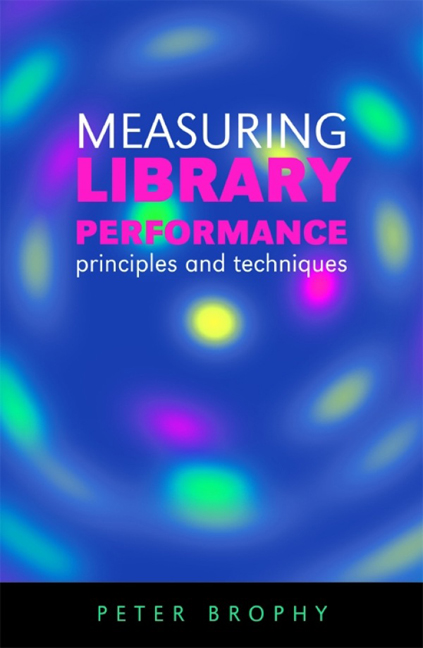Book contents
- Frontmatter
- Contents
- List of figures
- List of tables
- Preface
- Acronyms and abbreviations
- 1 Background
- 2 Theoretical considerations
- 3 User satisfaction
- 4 Impact on users
- 5 Social and economic impact
- 6 Inputs
- 7 Processes
- 8 Outputs
- 9 Staff
- 10 Infrastructure
- 11 Services for all
- 12 Benchmarking
- 13 The balanced scorecard
- 14 Standards
- Appendix 1 Data collection methods
- Appendix 2 The analysis of data
- Appendix 3 The presentation of results
- Index
- Frontmatter
- Contents
- List of figures
- List of tables
- Preface
- Acronyms and abbreviations
- 1 Background
- 2 Theoretical considerations
- 3 User satisfaction
- 4 Impact on users
- 5 Social and economic impact
- 6 Inputs
- 7 Processes
- 8 Outputs
- 9 Staff
- 10 Infrastructure
- 11 Services for all
- 12 Benchmarking
- 13 The balanced scorecard
- 14 Standards
- Appendix 1 Data collection methods
- Appendix 2 The analysis of data
- Appendix 3 The presentation of results
- Index
Summary
■ Introduction
No library exists in isolation, for within any sector the services offered will share many common characteristics. The user populations may be similar, though clearly not identical, equivalent types of resource will be stocked or made available and the processes engaged in will be comparable. For this reason it can be very useful to compare the performance of one library with others. It can also be useful to make internal comparisons between branches, departments or sections. The termbenchmarking is used to describe such processes of formal comparison.
Over ten years ago Charles Handy recounted an anecdote about benchmarking in his bookBeyond Certainty. He said: ‘
They went, they saw and they learnt – but not what they expected. They learnt no new techniques or pieces of electronic wizardry, but discovered instead that some firms expected failure rates up to 100 times better than theirs or had absenteeism levels ten times lower and, in one comparable case, new product development times five times shorter. Standards were different, that is all.
This form of organized learning has recently acquired a label – benchmarking, the discipline of measuring yourself against best practice in any function or field, often in industries very different from your own. The label, however, reduces to a technique what surely ought to be an ingrained habit – to aim to be not just good enough but as good as can be, to look beyond oneself in setting standards for oneself, to shun complacency and the false comforts of talking only to people like oneself.
(Handy, 1995)That story is a useful antidote to any idea that benchmarking is either an arcane art or an optional extra. Handy's argument is that it must become an integral part of everyday organizational life.
- Type
- Chapter
- Information
- Measuring Library Performanceprinciples and techniques, pp. 147 - 159Publisher: FacetPrint publication year: 2006



